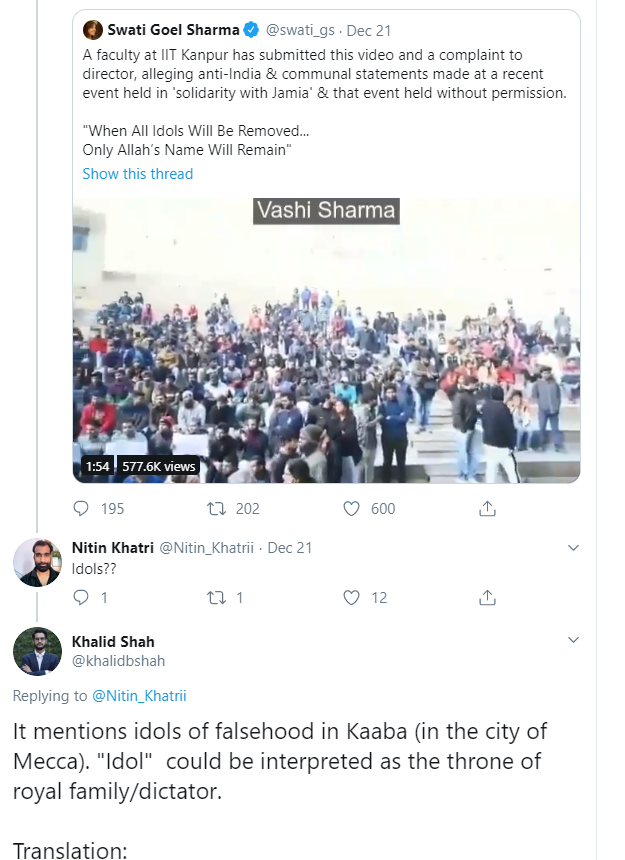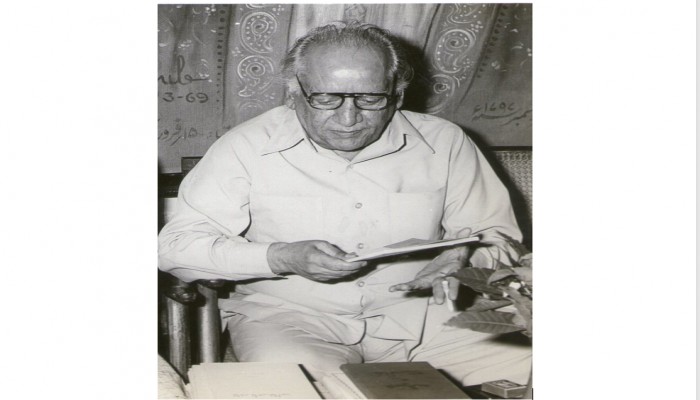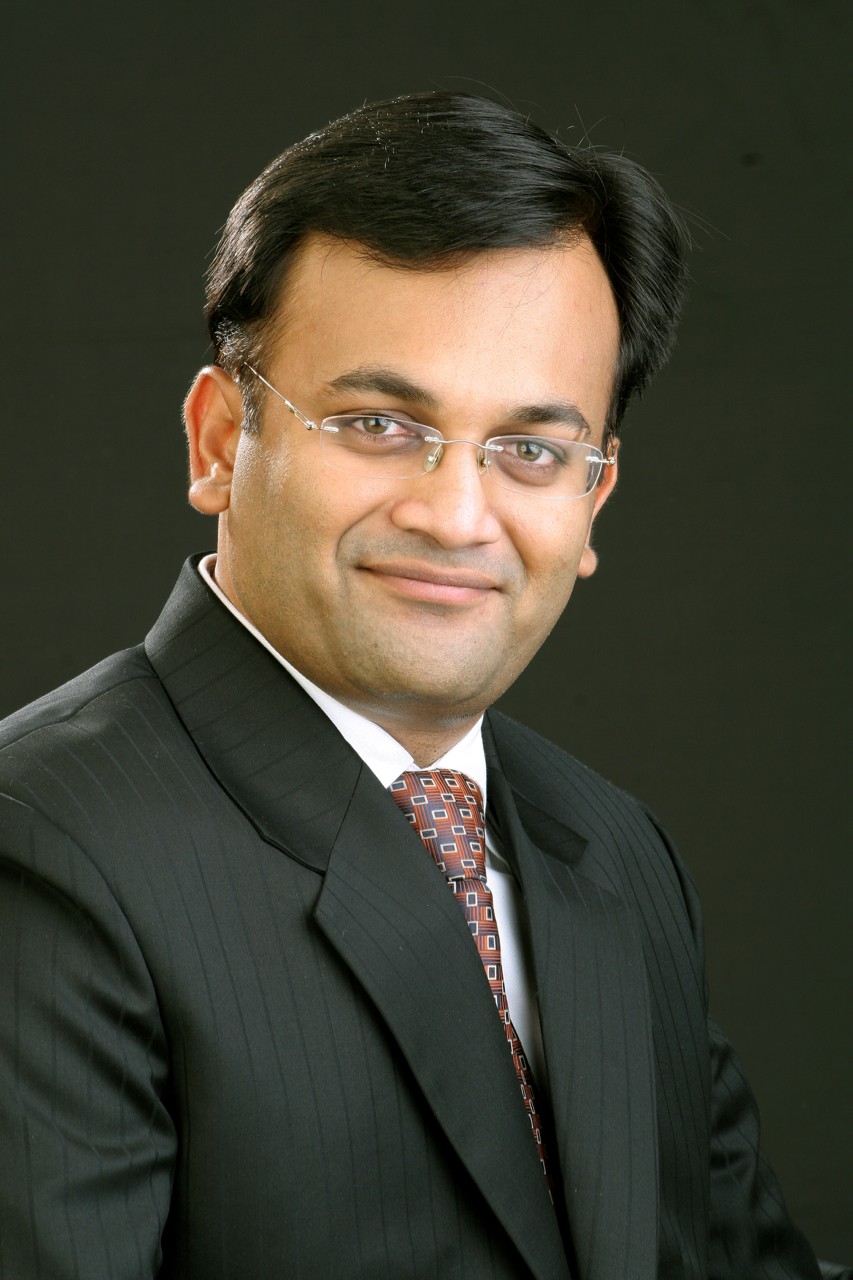Did Faiz root for “Aham Brahmasmi” in his verse “Hum Dekhenge?”
- In History & Culture
- 10:16 AM, Dec 27, 2019
- Ashish Naredi
There is a raging debate on the social media about the real meaning of a famous poem “Hum Dekhenge,” (We shall see) written by the well-known Pakistani poet Faiz Ahmed Faiz in the 1970s against the then dictator of Pakistan, General Zial-ul-Haq. The reason why this has run into controversy now, is the following two lines from the poem:
- “Jab arz-e-khuda ke kaabe se - Sab but (बुत) uthwaaye jaayenge” (When all idols will be raised from Kaaba in Mecca); and
- “Bas Naam rahega Allah ka” (Only the name of Allah shall remain)
- and the multiple meanings being attributed to them – especially after an incident in IIT Kanpur and this write up about the same in Swarajya.
While one section argues that the lines indicate “Hinduphobia” as it, ostensibly, calls for destruction of all idols so that only Allah’s name remains, the other section brings up the context of Faiz’s protest against Zial-ul-Haq and argues that idols do not mean ‘idols or deities’ akin to ‘moortis’ (मूर्ती) of the Hindus but that “idols could be interpreted as the throne of royal family/dictator!” (see screenshot)

This article is an audacious attempt on the part of this author, a common enthusiast of Urdu poetry, to go against the established scholars of Urdu and argue that both the interpretations of the verse, as given above, are wrong! And that, the real intent of Faiz’s words may not yet have been brought to light - as it is, perhaps, a little too radical to digest or discuss.
It may be noted at this stage that there is certainly nothing remotely Hinduphobic in this verse. Quite to the contrary, as you shall see in the later paragraphs, there could actually be congruence with the Hindu idea of God (Aham Bhramasmi) in the last few lines of this verse!
The key to understanding this verse is certainly the context(s) as suggested by the scholars. However, while the context of Faiz’s protest against dictatorship of General Zia-ul-Haq is given by all, two others equally, if not more, relevant contexts have been almost completely blanked out by everyone. These contexts are of:
- The Destruction of 300++ idols in Kaaba in the process of establishing Islam
While the Muslims may be aware of this destruction, a common non-Muslim reader may not be aware of the facts:
- That, ‘Kaaba’ used to house around 360 idols of pagan deities which were worshipped by the pagan tribes that inhabited Mecca then; and
- That, Prophet Mohammed destroyed (or got destroyed) all the pagan idols to establish Islam.
Now, in light of above context - let’s revisit the meaning attributed to these lines:
Jab arz-e-Khuda ke kaabe se
Sab but uthwaye jaenge
Author’s Translation & Interpretation
Translation - “From the abode of God (Kaaba) when all the idols will be raised (‘raised’ as in to mean exposed or resurrected and not ‘removed’ as is indicated by the scholars).
Interpretation – Those in power (General Zia) may be powerful and be feeling secure but they will be helpless in the face of revolution - which may be akin to (as revolutionary as) the raising / resurrection of idols in Kaaba! Then (when such a revolution happens):
- all crowns (of the rulers) will be tossed in the air (sab taj uchaale jaayenge)
- all thrones will be brought down or destroyed (sab takht giraaye jaayenge)
- and we, the pure at heart (ahl-e-safa) and the outcasts from power/harem (mardood-e-haram) shall be made to take the seat of power (masnad pe bithaaye jaayenge)
- We shall see this happen (Hum dekhenge)
Scholars’ Translation & Interpretation
Translation - “From the abode of God, when the icons of Falsehood will be taken out!”
There is no disagreement between the author and the scholars on points ‘a to d’ (as listed above) on what will happen when those in power (General Zia) are unseated. However, there is absolute disagreement on the complete blanking out of the powerful imagery used by Faiz to convey the magnitude of the expected revolution - which is depicted as one akin to the (anticipated) “resurrection of the idols” that were earlier destroyed in Kaaba.
Why the scholars’ interpretation is half-baked & erroneous
The scholars are guilty of three basic errors:
- Mistranslation
- They (mis)translate “but” (बुत) to mean icons instead of idols
- They (mis)translate “uthwaaye” (उठवाये) to mean ‘taken out = removed” as against ‘taken out = exposed or brought out’ or even the literal meaning उठवाये = raised (or resurrection).
- Wrong addition / attribution of word & meaning
- They wrongly add “falsehood” (icons of falsehood) to the meaning of the verse. Nowhere in the verse does Faiz mention “false/falsehood.” He just says idols - without any additional attribution.
- Key question of “which idols?” (if at all they are to be removed) is unanswered
Even if we were to go, for the moment, with the scholars’ interpretation - the key question to ask would be – Which ‘icons of falsehood’ or ‘idols’(बुत) are the scholars talking about removing from Kaaba?
The only icon, if any, that is present in Kaaba is the Kaaba itself and a stone that it houses – both of which are most holy in Islam and therefore, there is no way in which these may be even remotely suggested as false or as ‘icons of falsehood!’ Moreover, Faiz himself, calls Kaaba the abode of God (arz-e-khuda ke kaabe se). Now, he surely cannot be referring to the same Kaaba – both as the abode of God and an icon of falsehood in the same line in the same verse!
Inference
Therefore, for the above-mentioned reasons, it becomes abundantly clear that the only ‘but’ (बुत) that Faiz could possibly be talking about are the idols that were destroyed by the holy Prophet in his conquest of Mecca. And if these are the idols that are being spoken about, then ‘uthwaaye’ (उठवाये) could only mean ‘raised or resurrected.’
Be that as it may, the conclusion above may yet seem to be a bit too fantastic and radical for any poet to suggest. However, the fact that Faiz may indeed have been suggesting such a blasphemous idea becomes abundantly clear when we look at the second aspect of the context that the scholars have chosen to blank out – which is:
- The importance and true meaning of “lagega an-al-haq ka naara”
It is critical, in this context, to recollect the tale of Mansoor-al-Hallaj, a Sufi saint who was executed in 922 AD for proclaiming “An-al-Haq” which means “I am truth” or “I am him (God)!” - the natural corollary to which is that - “He (God) is me!” (See this reference).
To attribute divinity or to equate Allah with any person or thing, is considered to be ‘shirk’ – an unpardonable sin as per the holy Quran. Mansoor-al-Hallaj was declared guilty of shirk and hence executed. The death sentence notwithstanding, al-Hallaj stuck to his beliefs and continued to proclaim “An-al-Haq.”
Having learnt the above context and story – the reader may now (re)read the last stanza of the verse:
Bas Naam rahega Allah ka
Jo gaayab bhi hai haazir bhi
Jo manzar bhi hai nazir bhi
Uthega an-al-haq ka naara
Jo main bhi hoon aur tum bhi ho
Aur raaj karegi khalq-e-khuda
Jo main bhi hoon aur tum bhi ho!!
Author’s Translation & Interpretation
- ‘Only the name’ of Allah shall remain / survive (Bas Naam rahega Allah ka) as in to suggest that aspects other than the ‘true name of Allah’ may not survive. Please note that this is very different to Only ‘Allah’s name’ shall remain (as in to indicate that only Allah would be victorious and that all other Gods will be destroyed) as has been interpreted in the Swarajya article referenced earlier.
- Allah or a God (whose name remains shall be the one) who:
- is invisible as well as visible (jo gaayab bhi hai haazir bhi)
- is seer as well as the seen (jo manzar bhi hai naazir bhi)
- is me as well as u (jo main bhi hoon aur tum bhi ho)
- The Slogan of “An-al-Haq” will be raised (lagega an-al-haq ka naara)
- And the (true) humanity / mankind (created by God) will then rule (Aur raaj karegi khalq-e-khuda)
(This is where the similarity between Faiz’s conception of God and the Indic conception of God as described in Aham Brahmasmi (I am God and God is me) is brought out).
Scholars’ Interpretation & flaws
There is not much difference in the literal interpretations of the scholars and the author. However, the key difference is, as explained earlier, in the complete silence of the scholars on the significance of “An-al-Haq” and the story of Mansur-al-Hallaj – without the narration of which, this verse would seem like a body bereft of its soul / life!
Conclusion
In light of the above discussion, it can be safely concluded that Faiz’s true intent, as is borne out in his iconic poem “Hum Dekhenge,” was - a revolution, against the powers that be (in Pakistan), so revolutionary in its nature, that it would shake the very foundations of not only the state (Pakistan) but also of religion (Islam) itself! This, Faiz does by openly propagating ideas and slogans that are considered blasphemous in his faith. In one stanza he invokes the resurrection of all the idols destroyed in Kaaba and in another he propagates a concept of God which is more secular (closer to the Hindu conception of God – Aham Brahmasmi) and against the basic principle of Tawhid in Islam by equating humanity with divinity (An-al-Haq).
Given the explosive nature of the verse and its true meaning, it comes as no surprise that people desisted from discussing the above aspects in public.
Author's Note:
The above is purely a personal interpretation of the author with absolutely no malice towards any individual, community, faith or nation. The author did try to take views and comments of other scholars like Khalid Shah, Amina Yaqin and Arif Mohammed Khan via twitter on this interpretation. However, not receiving response (cannot expect them to see random tweets) the author felt it prudent to write this article in the interest of an open and civilised debate. The author seeks apology in case anything in the article, inadvertently and unintentionally, hurts anyone and shall be happy to be corrected in case of an error.







Comments